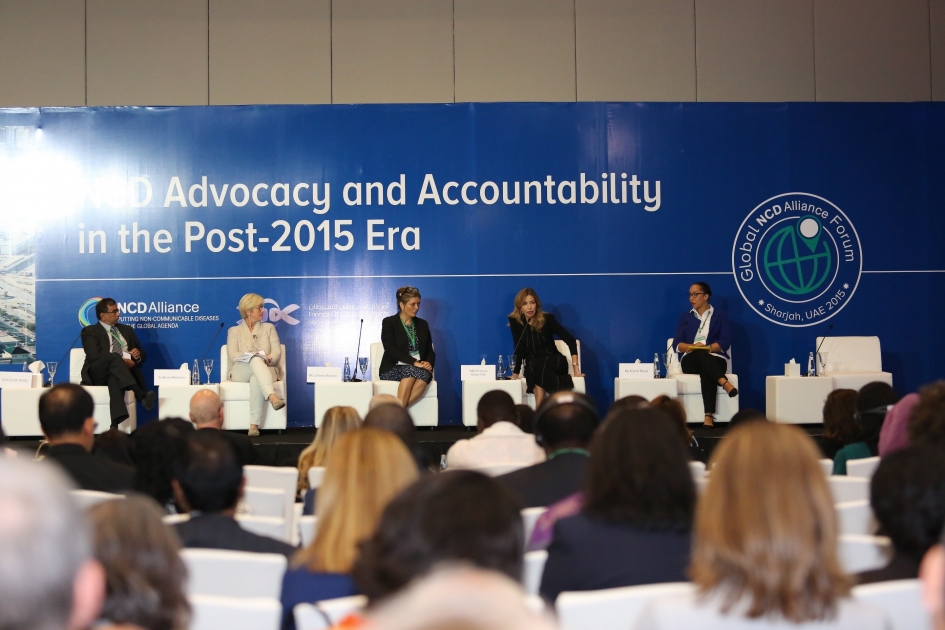
Global NCD Alliance Forum 2017 Will Aim to Equip Governments and Civil Society with a Powerful NCD Strategy for 2018
Four plenary sessions at the Global NCD Alliance Forum 2017, to be held next week in Sharjah, will examine the progress being made on tackling non-communicable diseases (NCDs). The sessions taking place over the three days of the biennial forum form a main part of its programme, which discusses effective strategies to prevent the lifestyle ailments that kill 40 million people each year.
Held under the theme ‘Stepping up the Pace for NCDs: Making 2018 count,’ the forum is a joint effort from the NCD Alliance and Friends of Cancer Patients (FoCP), a Sharjah-based non-profit organisation dedicated to fighting cancer and supporting patients and their families. The event is being hosted under the patronage of Her Highness Sheikha Jawaher bint Mohammed Al Qasimi, wife of the Ruler of Sharjah, Founder and Patron of FoCP, International Ambassador for the World Cancer Declaration of the Union for International Cancer Control (UICC) and International Ambassador for Childhood Cancer for UICC.
“Non-communicable diseases are a scourge on society, with the poorest communities suffering the most. In addition to taking a physical and emotional toll, NCDs have a significant economic impact because of the high cost of their treatment. Being chronic, long-term diseases, expenditure on these conditions is significant. NCDs undermine productivity, having economic impact on societies and governments,” said HE Sawsan Jafar, Chairperson of FoCP’s Board of Directors.
“Under the leadership of His Highness Sheikh Dr. Sultan Bin Muhammad Al Qasimi, Member of the Supreme Council and Ruler of Sharjah, Sharjah is taking a lead on fighting NCDs with its second Global NCD Alliance Forum, which will see more than 300 medical experts, health care policy makers and NCD Alliance stakeholders gather to assess and evaluate the immediate and long term measures for minimising the prevalence of NCDs. The four plenary sessions that form part of the forum’s agenda are a vital component of the fight against lifestyle diseases as they will examine the progress made so far, highlight current initiatives and discuss new strategies that can be implemented to combat them,” Jafar added.
“Political leaders around the world have a choice – they can either sleepwalk into a sick future as they are currently doing, or they can decide that hundreds of millions of lives are indeed worth saving. We call on political leaders to fall on the right side of history, attend the 2018 UN High-level Meeting on NCDs and commit to action,” said Katie Dain, CEO of the NCD Alliance.
Titled ‘The Global NCD Response: Taking Stock, Reviewing Progress, and Looking Ahead to the 2018 UN High-level Meeting,’ the opening plenary session on the evening of the first day of the forum will provide an overview of the global NCD response to date. Among other issues, it will take stock of global and national progress made and identify barriers, good practice and opportunities to improve NCD prevention and control. It will also highlight the advocacy opportunity presented by the 2018 UN High-level Meeting on NCDs and outline the urgent action needed to meet global NCD targets.
‘Uniting the NCD Movement for 2018: Framing the Narrative, Advocating for Action and Amplifying Voices’ is the title of the second plenary session, which takes place on the morning of day two of the forum. The session will present the NCD Alliance’s strategic campaign towards the 2018 UN High-level Meeting on NCDs, making the case for action priorities and exploring bottlenecks and barriers to progress. The session will also launch the Advocacy Agenda of People Living with NCDs and promote the meaningful involvement of youth in the NCD movement.
With its theme ‘Breaking Down Silos, Building Synergies: Accelerating NCDs in the 2030 Sustainable Development Agenda,’ the third plenary session on the afternoon of day two of the forum will highlight success stories in forging non-traditional civil society partnerships to catalyse NCD prevention and control. It will share experiences from other health and development movements for framing NCDs in the larger development discourse and will emphasise the important role of civil society to drive political action on NCDs.
The fourth and final plenary session, ‘Growing the Movement: Equipping Civil Society to Fulfill its Roles in the NCD Response’ on the morning of the third day will discuss the growth and sustainability of a unified NCD civil society movement by drawing on lessons learnt from other global health networks. It will promote and share good practice conducted across the NCD civil society movement to date, including launching the NCD Civil Society Atlas: National and Regional NCD Alliances in Action, which shares examples of the work undertaken by national and regional NCD alliances.
The first Global NCD Alliance Forum 2015 held in Sharjah culminated with the Sharjah Declaration on NCDs, which calls on governments to champion NCD prevention to curtail lifestyle diseases that are responsible for 63 per cent of all deaths globally.
The Declaration advocates including the voices of those affected by NCDs in policy development and calls on the United Nations to integrate NCDs into broader human rights and health and development policies.
























